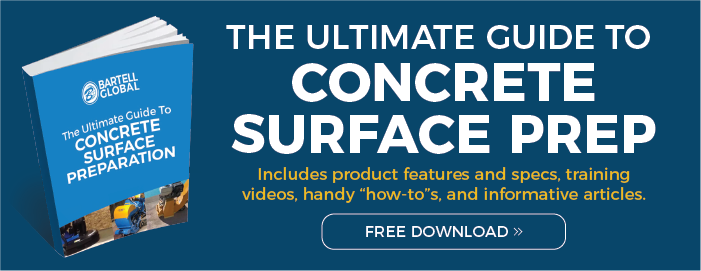When grinding concrete, one of the most important things to pay attention to is the type of tooling you are using. If you choose the wrong tooling, it will affect your productivity as well as the finish you are trying to achieve. It can also really damage your concrete. Here are some key things to remember if you want to get the most out of your tooling.
COST VS. PRODUCTION
We all tend to get sticker shock when we are evaluating what brand or quality of tooling we are looking at. Sometimes getting the least expensive tooling will work perfectly fine, but depending on what you're doing, you may need to invest a bit more of your budget to achieve the highest productivity. The reality is, all tooling is not made equal, so depending on the bond and diamond quality, you will get longer-last and more effective tooling if you go for higher end products.
The job you're doing will determine the type of tooling you'll need. If you plan on grinding a small area, then less expensive tooling will probably get the job done. For larger jobs, the life of the tooling will be incredibly important, so investing in something that holds its life will be beneficial in saving money long term. You may be able to purchase a certain kind or brand that is 15% more expensive, but will give you twice as much life. Keeping cost and production in mind is helpful for investing in the right tooling so you don't waste money.
The hard thing is knowing which tooling is best for your grinder and floors. Trial and error is the best way to find out the real life effect that different types will have. Experiment with a few different kinds and price points to see what works best for you based on the type of job.
UNDERSTAND BONDS
One of the most important things to understand when working with metal bond tooling is what a bond actually is. This is one of the keys to getting the most out of your tooling. All concrete is different in many ways. One of the main things that changes often is hardness. Concrete hardness can be measures a few different ways, but the main ones are PSI or a scratch test.
Different bonds are made to work on different harnesses of concrete. The bond is what wears away as you grind to expose the actual diamond segments that do all the work. If you have the wrong bond for the floor that you are grinding, you will either glaze over, or burn through your tooling very quickly.
If you are just doing general grinding on a small job, you may be able to get away with using a medium bond, which is normally what is used if you don’t know what the concrete hardness is. If you’re a contractor, I would recommend getting a harnesses testing kit because the amount of money you will save in production and grinding effectiveness with pay for that tool very quickly.
IDENTIFY THE END GOAL
This may seem so simple, but depending on the finish you want on your slab will also determine what type of tooling you may be able to use. For example, if you are planning on polishing the slab but have a coating to remove, you may think that PCD’s or other aggressive tooling would be the best option, not realizing that PCD’s have a high chance of leaving scratches in the floor that will not come out, resulting in a bad polishing job.
Identify the end goal and speak with tooling providers or your distributor about what tooling would be best for each step. If you only tell them that you’re looking to remove a coating, and leave out that you're wanting to polish the concrete after, they may suggest tooling simply for coating removal without considering the other steps you'll be doing after the coating is removed, which will end up ruining the finish.
Finding the tooling that works best for you may take some time, but it is well worth the investment. Once you know which tooling gets you the best production and result, you will be able to complete jobs much faster with less frustration.


 By
By 